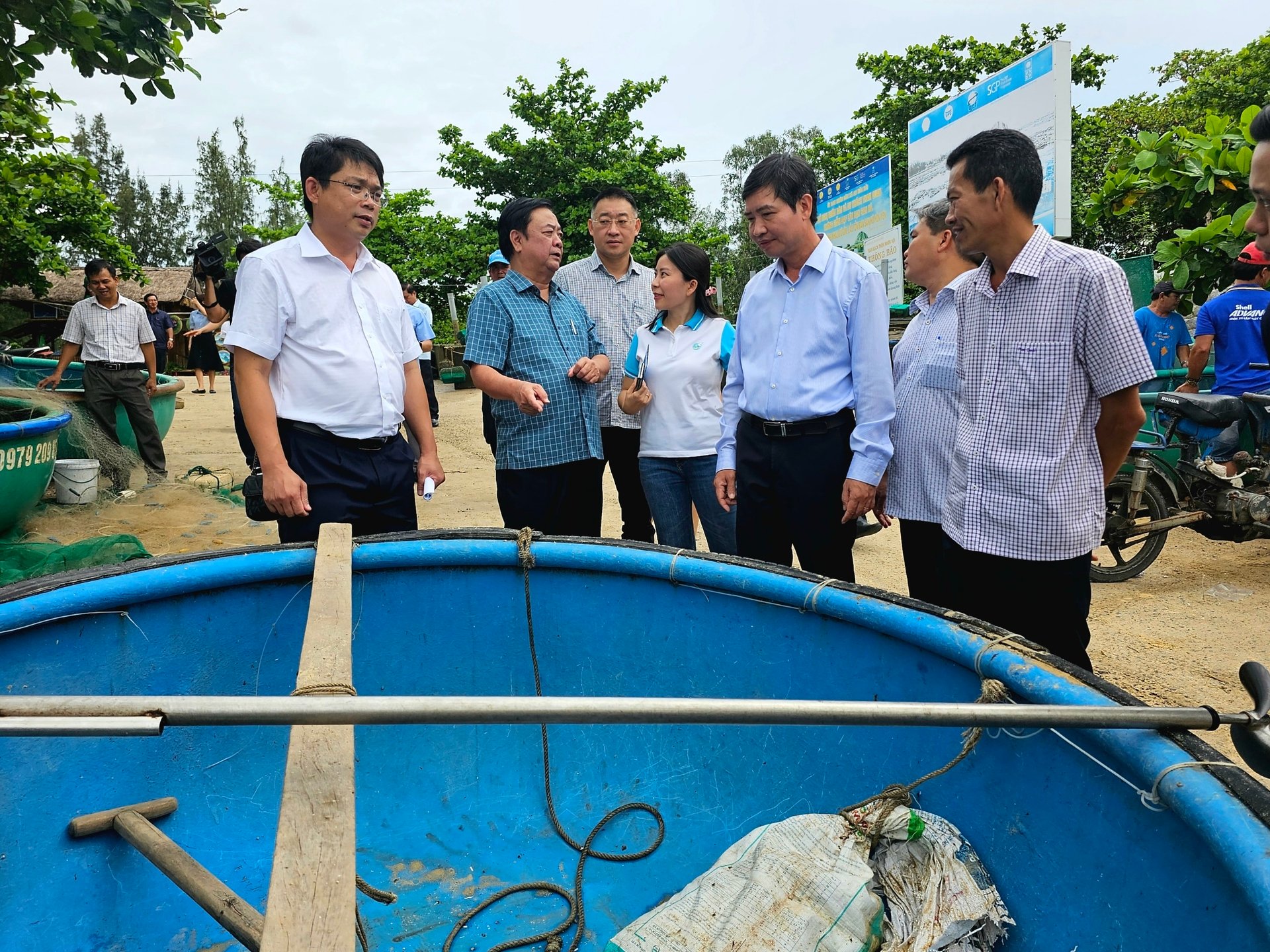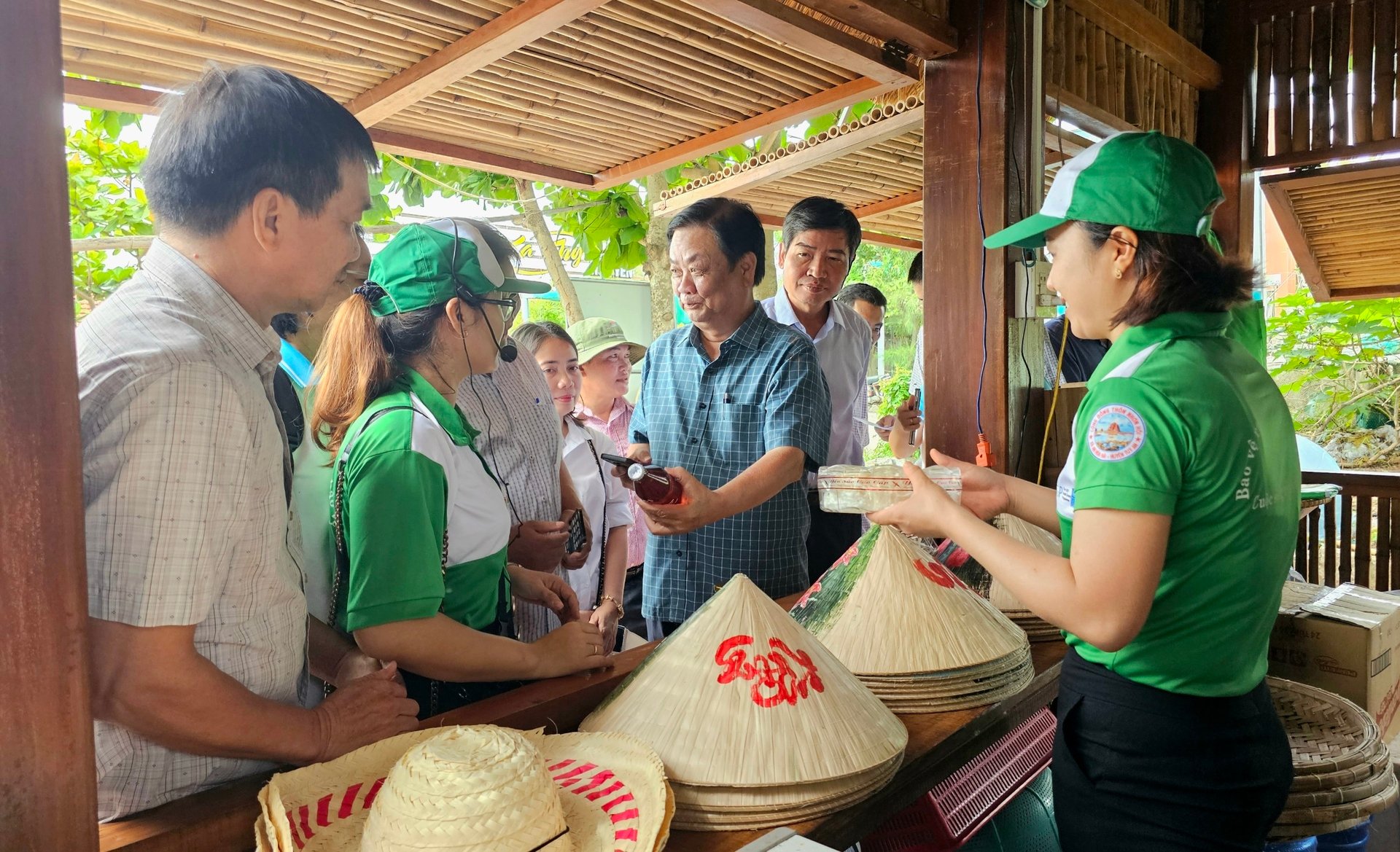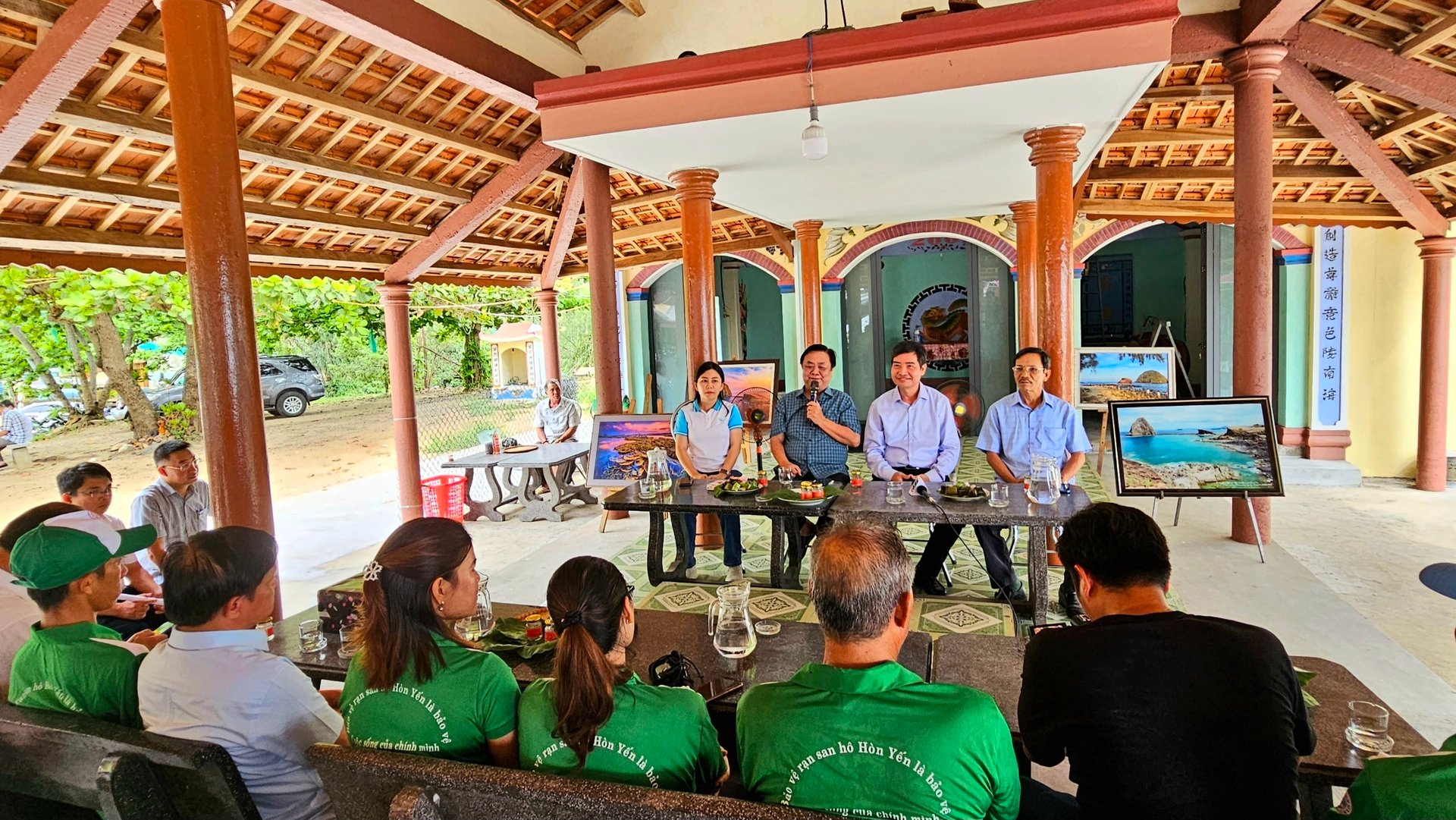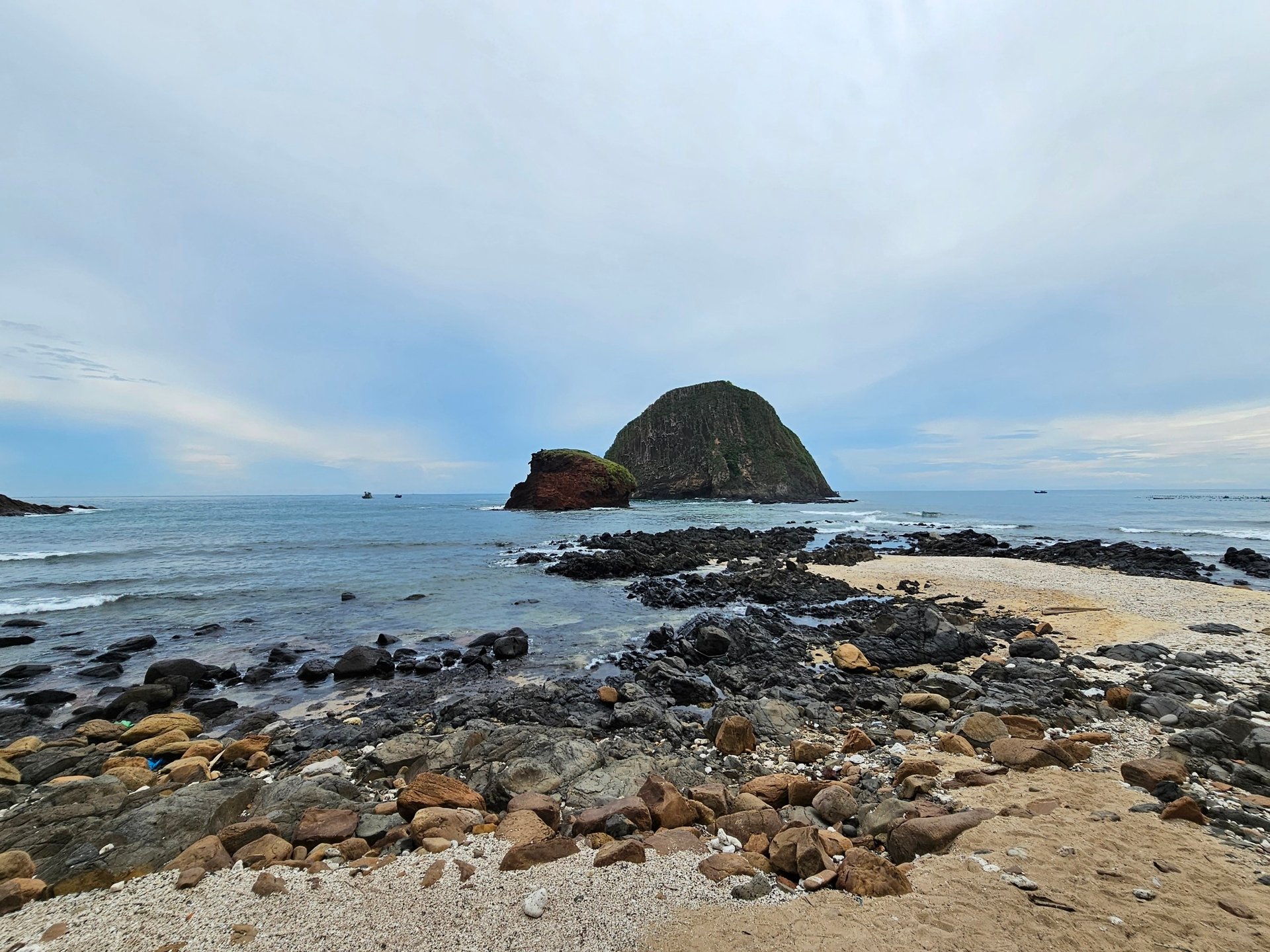June 20, 2025 | 01:17 GMT +7
June 20, 2025 | 01:17 GMT +7
Hotline: 0913.378.918
June 20, 2025 | 01:17 GMT +7
Hotline: 0913.378.918

Minister Le Minh Hoan visiting the community-based coral reef preservation model on Hon Yen island. Photo: Kim So.
During his official visit to Phu Yen province, Minister of Agriculture and Rural Development, Le Minh Hoan, paid a visit to the community-based coral reef preservation model on Hon Yen in An Hoa Hai commune, Tuy An district.
Subsequently, Minister Le Minh Hoan had the opportunity to experience the cultural practices of the Hon Yen village's fishing community. Additionally, he acquired insights into the community's approach to managing, preserving, and conserving the coral reefs. Most notably, the village has engaged in organizing tourism activities to create sustainable livelihoods for the local populace.
Minister Le Minh Hoan visited the modestly constructed Hon Yen management center, which features charming coconut palm roofing. During this visit, he was introduced to several local products including various types of locally-produced fish sauce, edible bird's nests, and vegetables.
According to Mr. Dinh Van In, leader of the Hon Yen community-based coral reef preservation group, Hon Yen attained official recognition as a national scenic attraction in April 2018. The island garnered interest and support from multiple governmental levels over the following two years. Accordingly, the Global Environment Facility - Small Grants Programme in Vietnam, which ia branch of the United Nations Development Programme (UNDP), sponsored the project titled "Strengthening community capacitiy for preserving the coral reef ecosystem of Hon Yen." Consequently, this initiative led to the establishment of the Hon Yen community-based coral reef preservation group.

Minister Le Minh Hoan conducting a cultural exploration of the fishing community in Hon Yen Village. Photo: Kim So.
During the initial phase, the community was authorized by Phu Yen province and Tuy An district to manage and protect the coral ecosystem of Hon Yen, which covers an area of 2.8 hectares. The community consists of 35 members who have been highly effective in preserving and developing the coral reefs. They have also established tour guide teams, offering community-based tours to visitors exploring Hon Yen.
According to Mr. Dinh Van In, Hon Yen features concealed grottoes created by unique rock formations, resulting a picturesque and tranquil marine environment. Mr. In claims visitors standing atop Hon Dun peak can fully immerse in the vastness of the sea and the boundless sky. Towards the northeast, visitors can observe Mai Nha Islet, a highly attractive destination for tourists in the land of Yellow Flowers and Green Grass of Phu Yen province. On the other hand, the southeast offers a view of O Loan Lagoon, celebrated for its stunning natural scenery and renowned for its exquisite delicacies such as blood cockles and king crabs.
The coral reefs at Hon Yen are predominantly distributed in the shallow area near the shoreline, unveiling their splendor during low tides. The reefs, which were formed on the volcanic sediment, possess a unique and distinct beauty compared to other types of coral found in deeper waters of various regions. As a result, Hon Yen holds remarkable potential for developing community-based tourism in the near future.

Minister Le Minh Hoan learning about the distinctive products of the Hon Yen fishing village. Photo: Kim So.
As a member of the Hon Yen coral reef preservation community, Mr. Truong Tan Lai shared that the local residents have become increasingly aware of environmental protection activities since the establishment of the community. Namely, they voluntarily participate in protecting the coral reef by treating it as their own livelihood and family possessions. Additionally, he hopes that the government at all levels and the Ministry of Agriculture and Rural Development will continue to support Hon Yen with further development.
Minister Le Minh Hoan was deeply moved by stories from the coral reef preservation community on Hon Yen. He remarked that the community-based management system in the protection of aquatic resources is regulated by the Law on Fisheries. However, the coral preservation model on Hon Yen is the first example of a community-based management system emerging from the search for a model that grants power to the people. It represents a significant shift in mindset because management has traditionally been the responsibility of the government, and citizens were the subjects of management.
However, the effectiveness of a system depends on how the citizens perceive their participation and independence. The community-based management system on Hon Yen embodies said spirit, and the Ministry of Agriculture and Rural Development aims to further promote this model in 2024.
The Minister commended the Hon Yen model, which emerged from its community's environmental awareness, the involvement of local governments and committees, and the participation of international organizations. Significant achievements on Hon Yen are the results of its people being given the freedom to manage the local coral reefs, which will also determine their livelihoods.

Minister Le Minh Hoan conversing with the Hon Yen coral reef preservation community. Photo: Kim So.
As a result, the Minister emphasized that this small-scale model must be further promoted. Most importantly, it represents a revolutionary approach to local governance. Furthermore, this design is well-received on a global scale as the world is moving towards a reduction of centralized power, granting additional authority to local communities. Consequently, the effective implementation of this design will encourage businesses and investors to engage in local investment.
"When businesses invest in a locality, they are concerned about the its response. As a result, despite its relatively small scale, the Hon Yen model is a significant transformation of a region's social management structure," the Minister stressed.
Regarding the future development of Hon Yen, the Minister suggested the community to actively formulate their own plans and schedules. Subsequently, the community needs to organize discussions internally as well as with the commune- and district-level government. Furthermore, the community may extend their plans to include other regions and international organizations. In doing so, they can attract additional resources for development.
"We traditionally conducted our planning process from the top to bottom level, so the desires of the people and communities are not fully understood. We are currently reversing this process by starting from the grassroots level, where communities formulate their own plans," the Minister explained. He further added that local development should rely on community self-reliance, not external appearances.
With regard to the same processed product, the ability to sell it effectively plays a pivotal role in determining the sales outcome. It underscores the significance of proficient business acumen. In various marketplaces, we often witness consumers willing to purchase goods at a higher price from sellers who exhibit cheerful and pleasant demeanor, as opposed to those with sullen or uncooperative dispositions. Hence, the presentation and image are of paramount importance. Minister Hoan underscores his desire for the Hon Yen community's portrayal to be one of radiance and affability.
He strongly encouraged community members to present themselves with positivity and optimism. They should foster a sense of unity and solidarity where the shared overarching aspiration is to transform Hon Yen into a destination renowned not only in Vietnam but also on a global scale. This ambition, once realized, will serve as an exemplification of how the residents of Hon Yen, Phu Yen province, are not only diligent fishermen solely focused on resource extraction, but also vigilant protectors of these resources and the pristine seas.

Hon Yen – a beauty that captivates the hearts of visitors. Photo: Kim So.
The Minister suggested Hon Yen to elevate its vision in order to attract additional resources. He emphasized that many individuals are willing to contribute, including social businesses that actively seek opportunities to extend their support. Moreover, Minister Hoan underscores the importance of promoting social goals on a global stage, which will yield recognition and financial contributions from the global community as a result.
Although financial gain may not be the primary objective, it naturally follows as a consequence of diligent efforts, ultimately contributing to an improved livelihood and income. With the availability of financial resources, the community will have a greater capacity to enhance and nurture Hon Yen, further enhancing its prosperity.
On this occasion, Minister Le Minh Hoan also presented gifts to the community dedicated to the preservation of Hon Yen's coral reefs in An Hoa Hai commune.
Translated by Nguyen Hai Long
![Turning wind and rain into action: [9] Digitizing hydrometeorological data in response to climate change](https://t.ex-cdn.com/nongnghiepmoitruong.vn/608w/files/news/2025/06/17/z6704423696987_15fd32ffc26d590d204d520c9dac6786-nongnghiep-165943.jpg)
(VAN) Farmers have begun accessing hydrometeorological applications to adjust their cropping schedules, aiming to ensure productivity and adapt to climate change.
![Turning wind and rain into action: [8] Real-time salinity detection and early warning technology](https://t.ex-cdn.com/nongnghiepmoitruong.vn/608w/files/news/2025/06/17/z6704423696987_15fd32ffc26d590d204d520c9dac6786-nongnghiep-151127.jpg)
(VAN) Thanks to the integration of modern hydrological-hydraulic models, remote sensing technologies, and artificial intelligence, the accuracy of hydrological forecasting has significantly improved.
![Turning wind and rain into action: [7] Early disaster warnings help marine farmers minimize losses](https://t.ex-cdn.com/nongnghiepmoitruong.vn/608w/files/news/2025/06/17/z6704423696987_15fd32ffc26d590d204d520c9dac6786-nongnghiep-142942.jpg)
(VAN) In recent years, thanks to early disaster warnings and forecasting, marine farmers in Khanh Hoa province have been able to reduce risks and losses, thereby improving production efficiency.
![Turning wind and rain into action: [6] ‘Four on-the-spot’ disaster management software](https://t.ex-cdn.com/nongnghiepmoitruong.vn/608w/files/news/2025/06/17/e5a48259d6a262fc3bb3-nongnghiep-183800.jpg)
(VAN) By simply activating the scenario on the disaster management software, the relevant authorities immediately know how many households need to be evacuated, where to evacuate them to, and by what means of transportation…
![Turning wind and rain into action: [5] Hue applies modern technology in disaster forecasting](https://t.ex-cdn.com/nongnghiepmoitruong.vn/608w/files/news/2025/06/17/z6704423696987_15fd32ffc26d590d204d520c9dac6786-nongnghiep-093938.jpg)
(VAN) In Hue city, modern technology has recently been applied in meteorological and hydrological forecasting and warning, helping to reduce the damage caused by natural disasters.

(VAN) A cutting-edge farming technique being implemented on an experimental ranch in Arizona's Sonoran Desert has already saved a billion gallons of water over five years, according to Civil Eats.

(VAN) Poultry and pig production and the environment can be boosted through enhanced water technology, according to new research.